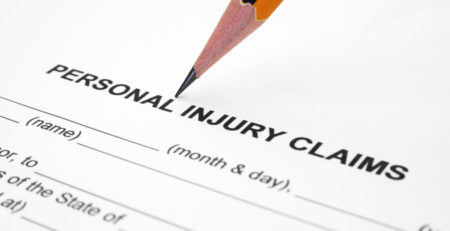What Factors Can Affect A Personal Injury Claim
If you sustained severe injuries due to no fault of your own in a car accident, from using a faulty product, or due to negligence at your workplace, in Indiana, you have a right to fair compensation from the plaintiff or the person responsible for your injury. However, before filing a personal injury claim in Indiana, you’ll want to know the factors that may affect the value of your claim.
We have just the information you need.
Here are the main factors that are likely to affect the value of your settlement.
The Type of Injuries Sustained
While it is easy to ascertain the economic damages such as lost wages and medical bills you incurred after a personal injury, determining the value of your non-economic damages is difficult. Non-economic damages include:
- Pain
- Suffering
- Loss of body function
- Emotional anguish
To determine the value of non-economic damages, the value of your economic damages will be calculated, and a multiplier used on the value to come up with the total settlement for your injuries. The multiplier will range from one to five, depending on the seriousness of your injuries.
A higher multiplier may be used if you sustained serious injuries such as:
- Hard tissue injuries
- Brain injury
- Damage to the nerves or spine
- If you underwent surgery or reconstruction of joints
- In the case of long term treatment, medication, or chronic pain
- Permanent injuries such as the loss of a limb or the permanent loss of the use of one or more of your body functions
- Many follow up medical appointments
- Injuries that affect your daily life, e.g., like injuries that make it harder to work on specific tasks
- Injuries that make you dependent on others
- Injuries that need you to take time off from work, school, or other activities that you used to enjoy
There are various factors that may make your claim be assigned a lower multiplier. These include:
- You suffered soft tissue injuries such as sprains or bruising
- Medical expenses that are for diagnosis rather treatment
- Non-visible scars
- Few medical visits to the hospital
- No medication prescribed after diagnosis
- Short recovery period
- No long-term care or treatment was needed
- No permanent injuries
- No emotional or physical harm visible after the injury
Jurisdiction
Having a viable personal injury complaint is not the only requirement for you to win a lawsuit claim. You also need to file a complaint in the right court. For instance, if you file your case in a federal bankruptcy court, your case may be dismissed since the court is only charged with deciding bankruptcy claims.

Moreover, each jurisdiction has its own laws, which are used to determine if you have a valid claim. For instance, in some jurisdictions, there are laws that determine the type of evidence that is acceptable in a personal injury claim. Others have an upper limit of the damages you can receive from a claim. Therefore, if the jury awards you a higher amount of damages than the upper limit, the judge will most likely reduce it.
The complexities of jurisdiction requirements make it prudent to work with a personal injury lawyer. The attorney will advise you on issues related to the jurisdiction that can affect your case.
Treatment Received
The treatment you received after your injuries will also determine the outcome of your claim. For example, if you got treated multiple times for your injuries, your chances of winning the case are higher.
However, be aware that not all treatments are deemed necessary. For instance, let’s say you visit a reputable medical doctor and your bill shoots through the roof. If the court ascertains that you could have gone to your local clinic that would have charged you less for the same care you received, the judge may rule that you pay for the medical expenses yourself.
Also, if there are issues with your treatment, such as your diagnosis being more expensive than your treatment, the judge may decide that your medical bills should not be paid.
Finally, the type of doctor you visit is also important. Getting treatment from alternative treatment medical practitioners such as physical therapists and acupuncture may make your claim less legitimate.
Blame for the Accident
When you file a personal injury lawsuit, the judge will want to hear if the plaintiff was entirely to blame for your injuries. You need to provide evidence in court to prove that you had no part to play in the accident.
However, if it is decided that you were partially to blame for the accident, your compensation is likely to be reduced. This is especially if your state follows the comparative negligence rule.
Indiana follows the comparative negligence rule. This rule calculates the compensation due to a victim based on a formula that determines the degree of fault for both parties.
For instance, if you were in a car accident and you were found to be 30% at fault while the other driver fault was ascertained to be at 70%, the compensation you are entitled to will be reduced by 30%. Thus, if your total compensation is determined to be $100,000, you will receive $70,000.
However, if your state uses the contributory negligence rule, you may lose your claim as this rule isn’t as forgiving as the comparative negligence rule. According to the contributory negligence rule, if a victim shared any fault percentage for the accident, he or she is not entitled to any compensation. Therefore, if you are found to have 5% fault in the accident while the other party was found to have a 95% fault, you won’t receive any compensation from your lawsuit.
Pre Existing Medical Conditions
While a pre-existing medical condition will not bar you from receiving your personal injury compensation, it may impact the value of damages you receive. Thus, you should reveal such conditions to your attorney before the lawsuit begins.
Some of the pre-existing conditions that can affect a personal injury claim include:
- Previous injuries that are from an unrelated accident
- Congenital and birth abnormalities
- Medical conditions that you suffer from such as anxiety or asthma, which surface during stressful times
- Previous injuries that are yet to heal
Your attorney will find the needed proof to defend your pre-existing medical conditions. He or she should also show the court that the personal injuries you are seeking compensation for are from the current accident and not due to any pre-existing medical conditions.
Assumption of Risk
If you willfully took part in a risky activity, knowing well that the activity was dangerous, the defendant may use the ‘assumption of risk’ defense against you.

For example, if you are playing organized basketball with other players and you get elbowed, the defendant may argue that you knew that there was the risk of getting elbowed in a basketball game.
However, for this defense to count in court, the harm you suffer must be closely related to the activity’s risk. For example, if you were injured while playing basketball due to a faulty basketball hoop, the defendant can’t use the assumption of risk defense in court as a faulty basketball hoop isn’t an expected danger in a basketball game. A personal injury attorney can help you determine if this type of defense can affect your injury claim.
A personal injury attorney can also help you prepare a persuasive argument that will increase your chances of getting fair compensation for your injuries, whether the negotiations are done in or out of court.





